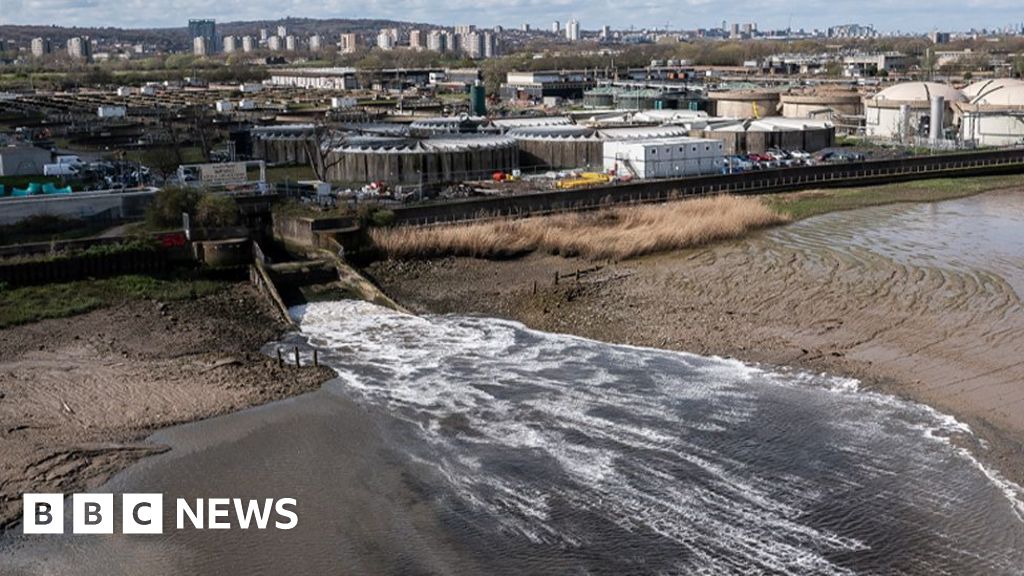Thames, Yorkshire and Northumbrian Water face £168m fines over sewage spills

Thames Water, Yorkshire Water and Northumbrian Water face £168m fines by the industry regulator over historic sewage spills.
The proposal will now go to public consultation and is part of Ofwat’s largest ever investigation into water company performance.
The announcement comes amid growing public anger over the environmental and financial performance of some water companies.
Sewage spills into England’s rivers and seas more than doubled last year.
Ofwat’s investigation has looked into whether the three companies have been providing customers with the level of service they are entitled to under the law.
It has found the three companies failed to adequately invest in and maintain their networks, leading to repeated releases of raw sewage into the country’s waterways.
On Tuesday it proposed fines of £47m for Yorkshire Water and £17m for Northumbrian Water. For Thames Water it is proposing the largest fine on record of £104m.
The regulator’s chief executive, David Black, said: “Ofwat has uncovered a catalogue of failure by Thames Water, Yorkshire Water and Northumbrian Water in how they ran their sewage works and this resulted in excessive spills.”
This announcement follows a BBC investigation earlier this year that revealed sewage had potentially been released illegally 6,000 times in 2022 by England’s water companies in breach of their permits.
Releasing raw sewage has the potential to significantly damage the environment and poses a risk to human health for those swimming in a river or sea where sewage is being discharged.
Ofwat can fine companies up to 10% of their annual sales. In the case of Thames Water, the proposed fine is 9% of sales, which Mr Black told the BBC “reflects the severity of the offences”.
The regulator found that more than two-thirds of Thames Water’s wastewater treatment works had operational issues, and that most of Yorkshire Water’s wastewater treatment works had regularly spilled sewage into the environment since 2018 pointing to a “systematic issue”.
The BBC has contacted Thames Water for comment.
A Yorkshire Water spokesperson said: “We are disappointed with Ofwat’s response to their investigation into our wastewater treatment networks. Since the start of this process in November 2021, we have co-operated fully with the investigation.”
But in its findings Ofwat said Yorkshire Water “had failed to recognise the full extent of its breaches”.
Northumbrian Water has also been approached for comment.
Ofwat continues to investigate a further eight water and wastewater companies in England and Wales for similar issues, with further updates expected in the coming year.
“For too long, failure to invest in our vital water infrastructure has been unchecked,” said Tessa Wardley, director of advocacy at environmental charity Rivers Trust.
“It seems highly likely that there is more to come when investigations into the other eight water companies is concluded.”
Water companies have been proposing to raise customer bills by more than 44% over the next five years to pay for improvements in water infrastructure.
Thames has argued for an increase of £191 over the next five years but Ofwat has only agreed to £99.
But there has been concern from environmental campaigners that the money from customers’ bills is not being sufficiently invested in upgrades and they have called for a ban on executive bonuses.
The government is currently consulting on plans to ensure that money earmarked for upgrades cannot be used to pay salaries or dividends.
On Tuesday, Environment Secretary Steve Reed said: “I welcome Ofwat’s action today. The unacceptable destruction of our waterways should never have been allowed – and it is right that those responsible for illegally polluting our rivers, lakes and seas face the consequences.
“This government will fundamentally reform the water sector.”
The threat of fresh fines will raise questions about how much some companies can afford to invest in infrastructure upgrades.
Thames Water has been struggling with debts of £14.7bn.
It announced last month it only had enough cash to fund operations until the end of May 2025 – and was already at risk of having the credit rating of its debts downgraded.
When asked by the BBC’s Today programme what would happen if companies could not afford to pay the fines or make the necessary upgrades, Mr Black said: “We have the power to impose these fines on companies and if they fail to do so then they will effectively defaulting on their obligations. So I am sure we will collect these fines.”
Related
Why investing in women is a vital next step for…
Get Nadine White's Race Report newsletter for a fresh perspective on the week's newsGet our free newsletter from The Independent's Race CorrespondentGet our fre
Business secretary signals major shift on electric car policy to…
In a determined effort to retain Nissan’s manufacturing presence in Britain, Business Secretary Jonathan Reynolds has vowed to implement “substantial c
Joint Statement: Business Secretary and Fujitsu Services Ltd
Business and Trade Secretary Jonathan Reynolds today (Friday 7 March) met chiefs for Fujitsu in Tokyo to begin talks over the cost of redress for victims of th
UK foreign secretary backs multilateral defence funding for Europe
UK foreign secretary David Lammy has said that a new multilateral fund will be needed to secure Europe’s defence as he confirmed that Britain is “open to”













